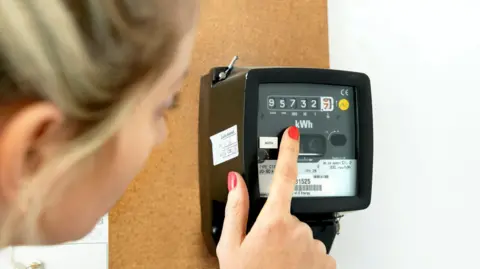**Warning on Electricity Meters: Over 300,000 Homes at Risk of Losing Heating**
Recent reports highlight a critical issue affecting more than 300,000 homes in the UK, as outdated electricity meters known as Radio Teleswitching Systems (RTS) face imminent shutdown. As energy companies prepare for the discontinuation of this old technology, which has been in use since the 1980s, there is a growing concern that many households could find themselves without heating or hot water after the 30 June deadline.
Energy companies have acknowledged the difficulties they face in replacing all RTS meters with smart meters before the switch-off. They describe the challenge as “very, very difficult” and have indicated that the current pace of replacements is insufficient. According to campaign groups, this matter has been labeled by the energy regulator, Ofgem, as an urgent consumer welfare issue, highlighting the pressing need for swift action.
**The Challenge of Replacement**
Currently, RTS meters operate by using a longwave radio frequency to switch between peak and off-peak energy rates. However, the technology has become outdated, leading to the announcement of a final deadline for replacements. Data from Energy UK indicates that as of the end of March, approximately 430,000 households continued to use RTS meters. Despite reports of 1,000 meters being replaced daily, this rate is far too slow to meet the deadline, necessitating an increase to approximately 5,000 replacements per day to reach all customers in time.
Amid this backdrop, Ned Hammond, the deputy director for customers at Energy UK, stressed the need for an accelerated replacement rate. He noted that, while efforts were being made to increase the pace of replacements, reaching the target by the end of June remains a daunting task.
**Consequences for Households**
The ramifications of an unchecked conversion could be severe. Simon Francis from the End Fuel Poverty Coalition indicated that over 300,000 households might be left with non-operational meters come July 1. The risk of disruptions is particularly concerning for vulnerable populations who might struggle to manage without heating during colder months.
RTS meters control heating and hot water separately from other electrical systems, meaning plug sockets and general lighting would remain unaffected. Nonetheless, the need for efficient replacements is underscored by the growing pressure on the HVAC systems, particularly as the transition period approaches.
**Consumer Concerns and Mistrust**
A significant hurdle in the replacement initiative is a public mistrust of smart meters. Concerns regarding their reliability and variability based on location lead many to resist the switch. Jane, a resident of Norfolk, expressed her reluctance to adopt a smart meter, despite feeling pressured to do so. She noted, “It’s not yet lawful to say I’ve got to have one. And I really, really don’t want one. I’m perfectly happy with the way things are.”
Conversely, others like Diane Gray of Cumbria express a desire for smart meters, yet struggle to get the necessary installations due to compatibility issues with their current heating systems. These conflicting consumer sentiments highlight the challenges energy providers face in implementing the new technology.
**Next Steps for Consumers**
For individuals uncertain whether they have an RTS meter, Ofgem has provided criteria for identification, including the presence of a switch box labeled for Radio Teleswitching, or if homes are heated with electric or storage heaters and there is no gas supply. If household members suspect they may be due for a change, it is crucial to contact their energy supplier proactively to facilitate a smooth transition.
In summary, as the deadline for RTS meter replacements approaches, the urgency for action grows. Although energy companies commit to an increased pace of replacements, real challenges remain both in logistics and public acceptance. The situation continues to evolve, and consumers are encouraged to stay informed and engaged with their energy suppliers.



